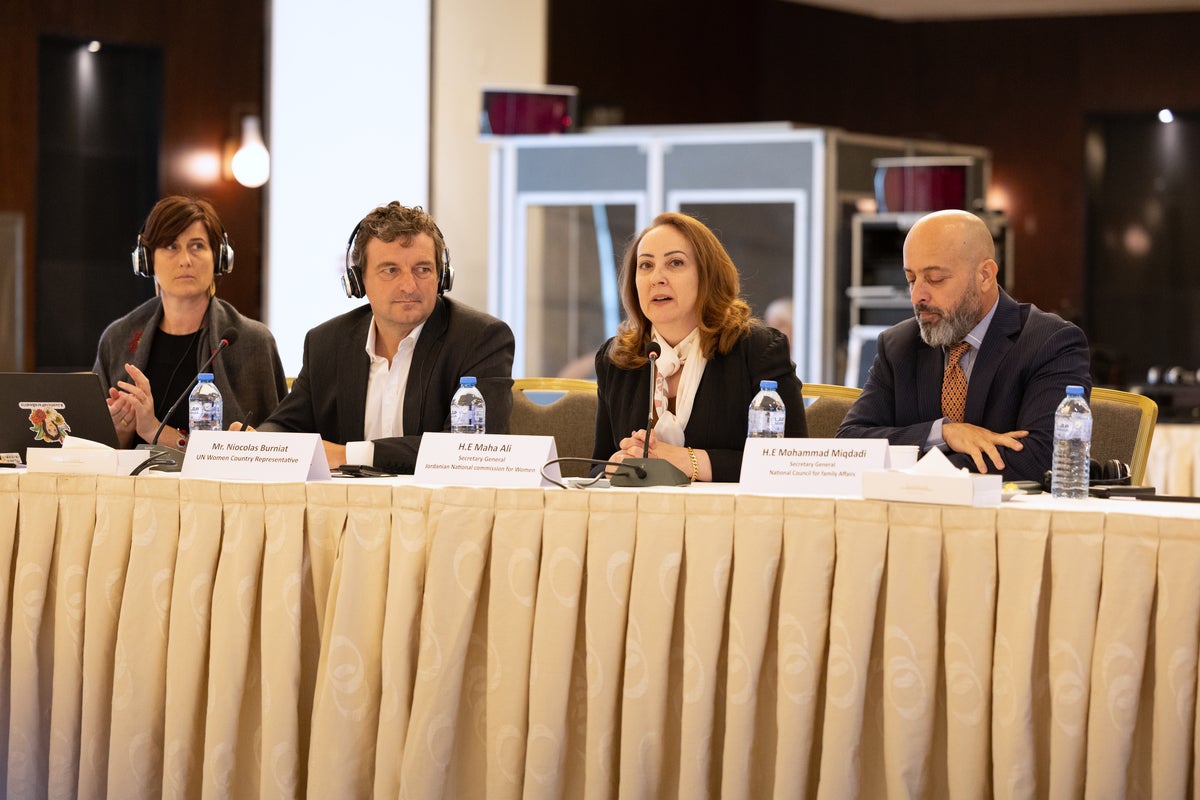A Safer Future for Women and Girls
A roundtable discussion on joint efforts to address gender-based violence in support of the National Strategy for Women, the National Framework for the Protection of the Family and the Jordanian National Action Plan on Women, Peace and Security.
Date:
[Press release]

Amman, Jordan, “A Safer Future for Women and Girls” was hosted by UN Women, in collaboration with the Jordanian National Commission for Women (JNCW), the National Council for Family Affairs (NCFA) and the UN Trust Fund to End Violence against Women (UN Trust Fund). The event took place in Amman, bringing together key stakeholders including civil society organization involved in the implementation of the Second Jordanian National Action Plan (JONAP II) and grantees from the UN Trust Fund to address their contribution to national efforts to prevent and respond to gender-based violence (GBV).
The first session of the round table was focused on the national context and efforts to address GBV. Discussions in this session included an overview of GBV initiatives under JONAP II, discussions on specific GBV projects and their impacts, insights into initiatives addressing GBV in promoting peace and humanitarian efforts, and presentations on the protection and prevention role of NCFA in addressing GBV. The second session featured a stakeholder engagement dialogue with donors, government representatives, and civil society organizations on the experiences, challenges and best practices in addressing Violence Against Women (VAW) in Jordan.
H.E. Maha Ali, Secretary General, Jordanian National Commission for Women, said, "Building on the lessons learned from JONAP I, we have introduced significant changes in JONAP II, including a new component on crisis management. Women were the most affected by COVID-19 and continue to be disproportionately impacted by climate change. A recent study launched by JNCW on “The Economic Cost of Domestic Violence against Women in Jordan” revealed the total cost of domestic violence experienced by women and girls aged 15 and above in Jordan is JD 130.1 million per year in 2021 (0.4% of GDP). As a part of the study recommendations, Her Excellency mentioned, “Establish programs to economically empower survivors of domestic violence and expand cash support programs to include survivors of domestic violence.”
H. E. Mohammad Miqdadi, Secretary General National Council for Family Affairs stated, "Putting families at the heart of our fight against violence is essential, especially in Jordan where family bonds are paramount. By targeting family units and fostering their resilience, we create a stronger foundation for a safer society. Additionally, enhancing our national systems through improved coordination, continuous development, and vigilant monitoring of policies ensures a comprehensive and effective approach to combating violence. Together, we can build a future where every individual is protected and empowered."
Ms. Abigail Erikson, Chief, UN Trust Fund, said, “Three decades since the UN Trust Fund was established, we still wholeheartedly believe that women’s rights and civil society organizations play a crucial role in delivering bold, innovative and life-changing initiatives and programmes to prevent and end violence against women and girls. It is key that they are part of the discussions and solutions in effective implementation of the National Action Plan to safeguard women’s rights in Jordan.”
Mr. Nicolas Burniat, UN Women Country Representative, said, "In a context where national and international financial resources for work on gender equality are limited, it is essential to ensure that we all work together, hand in hand and in a coordinated manner: government, civil society and international partners. This has been the spirit under which JONAP has been implemented and we are delighted to be working closely with the UN Trust Fund for Ending Violence against Women to ensure that we maintain this approach as we scale up support for national efforts to prevent and respond to GBV."